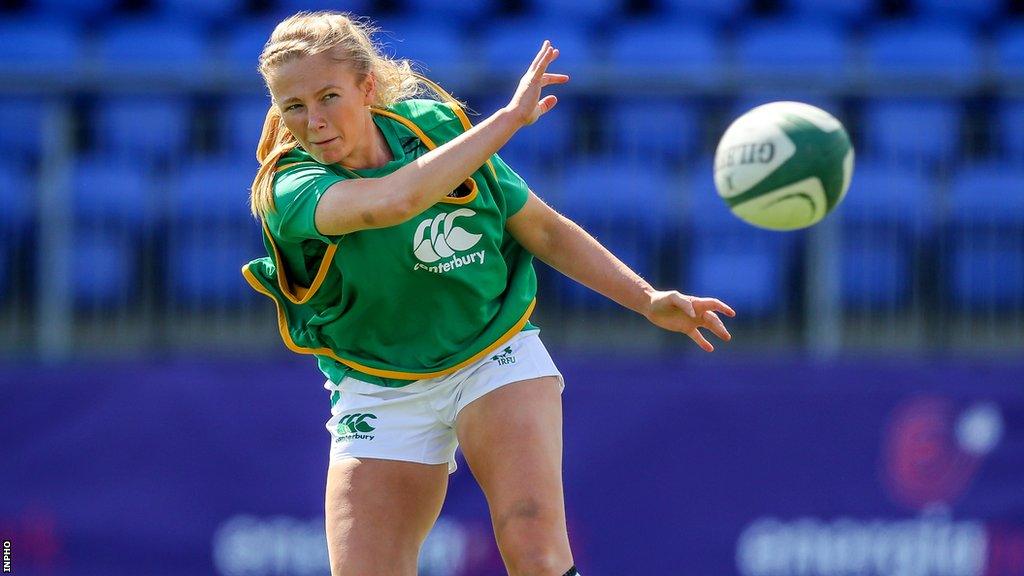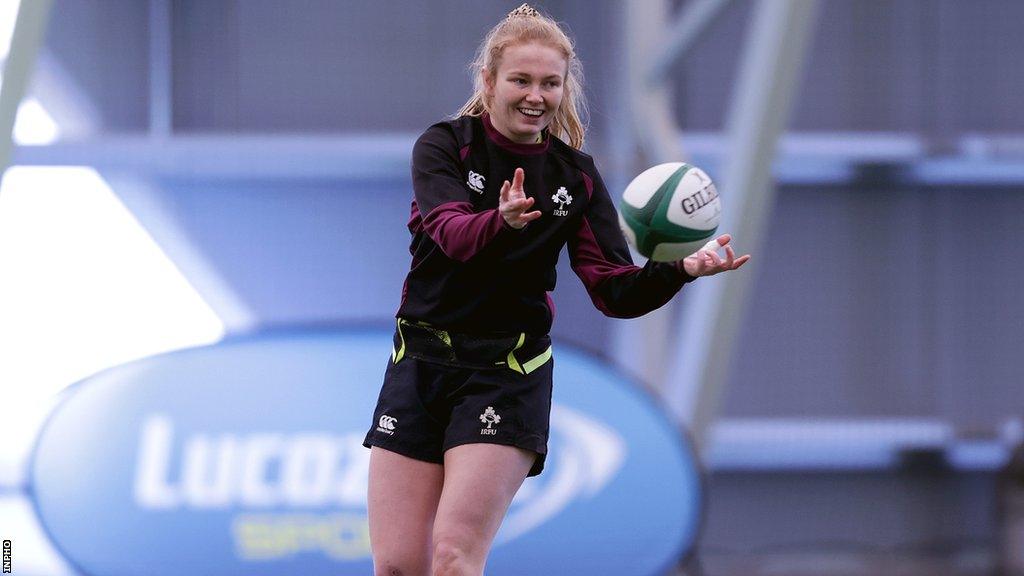Kathryn Dane: Ireland scrum-half talks about her recovery from a brain haemorrhage
- Published

Scrum-half Kathryn Dane has won 23 Ireland caps since making her debut in 2019
"Before, I used to go through life at 100mph and not really appreciate the good things, achievements or learnings that I've had.
"Since the stroke, I have realised when you are in those dark places, that is when you start to see all the light you have in your life.
"You can't change the cards you are dealt with. You just have to try and react. It's a chapter in my story that I've had to overcome."

Aged 26, Kathryn Dane's life changed towards the end of 2022 during a "normal day of training".
The Ireland scrum-half was rehabbing after an anterior cruciate knee ligament injury at the IRFU's High Performance Centre in Dublin when she suddenly took ill.
"I was in at 7am doing some warm-up sets and hip thrusts with my S&C [strength and conditioning] coach Ed Slattery," Dane recalled.
"I just got this massive pain behind my right eye in the back of my head. I didn't feel great but up until that point I was 100%.
"Ed noticed straight away that my face had dropped. I didn't notice but I didn't feel great.
"He got the team doctor, who was in the gym at the time, to have a look at me and they knew straight away that I had a stroke of some description."
Just 15 minutes after falling ill, Dane was in Connolly Hospital in Dublin and under the care of doctors. It was revealed she had suffered a brain haemorrhage, which was the result of a cluster of blood vessels in her brain that she had been born with but had never been detected.
"I was born with but didn't know about it until it burst," she added.
"It was so fortune that it happened where it happened. It was scary and a bit shocking at the time.
"The speed at which the thing took hold was incredible. I had immediate left-sided weakness.
"Thank god I wasn't on my own on a gym floor and I was in the HTC which was so close to the hospital where I needed the treatment straight away.
"I'm so thankful for being in here at the time because I would have had a totally different outcome. With these things, time is everything."
'Emotional to come to terms with'
Aside from her rugby, Dane, who has won 23 Ireland caps since making her debut in 2019, has a background in physiotherapy and she said that helped her understand "what was happening to me".
She added that she was in "shock" at the time and that it took her months to process her experience, which was made public in an Instagram post in February.
"I was in such shock that I didn't let fear or any of that anxiety creep over me. I just let the guys do what they had to do and gave them the information that I knew they needed," she added.
"To be honest, it wasn't until about two or three months afterwards before I started to digest and process it.
"It was really, really emotional and very difficult to come to terms with, but for the first two or three months I was just like in survival mode, trying to sleep, eat and recover as much as I can.
"I don't know whether it is the elite athlete in me, but we're not used to making time for the emotional processing of these big injuries. So that was probably the biggest step in my recovery.
"I'd treated patients with strokes in the past as a physio. I'd remembered patients who had multiple strokes from the exact same thing and I thought, 'ugh, is my life going to look like that?'
"I don't want to be one of those people who keeps looking over their shoulder. I've never lived in fear before but when something like this happens to you out of the blue you think, 'gosh, I'm vulnerable', for the first time in my life."

Dane was at the IRFU's High Performance Centre when she suffered a brain haemorrhage
Dane said her perspective on life has changed since the incident and she has spoken to former Ulster and Ireland flanker Chris Henry, who suffered a mini-stroke in 2014 before returning to play.
The Fermanagh native, who is on a full-time contract with the IRFU, added she is taking her recovery, and any possible return to rugby, "day-by-day and week-by-week".
"I'm very, very lucky that I'm in the full-time programme doing all my gym sessions and conditioning sessions," she said.
"I'll hopefully be running in the next four to five weeks. I want to make sure I am in the best place physically before I even begin to make that decision about returning to contact and returning to play.
"I'd love to play but I just have to take these steps beforehand, like any other injury."
While she is recovering, Dane has been working on a PhD, coaching and says her support network has allowed her to "live life as full as possible".
"At the time I was told I had a brain haemorrhage, it will be a new normal and you will have to live with the aftermath," Dane added.
"I'm doing really, really well considering. I was told the whole time by the medical teams, don't rush back into things and don't feel like you are taking too long to reintegrate with stuff.
"I think they are all shocked and surprised with how well I have coped and adapted.
"I am going to be properly grateful for what I have and enjoy rugby and all the moments that I have. I think I did take it for granted a bit before."